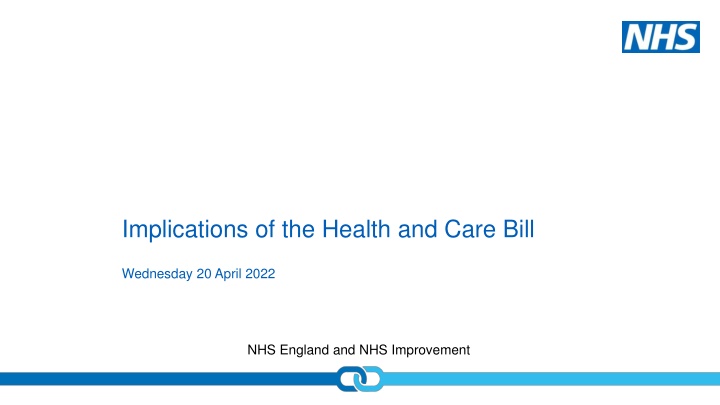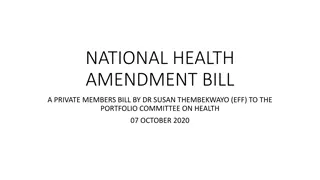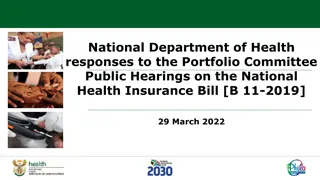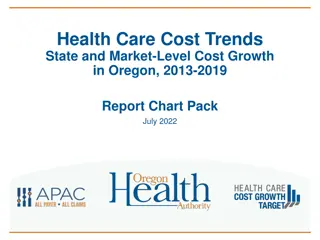Implications of the Health and Care Bill Timeline
The Health and Care Bill timeline outlines key policy developments from 2014 to 2021, including NHS recommendations to the government, establishment of Integrated Care Systems, and legislative progress. It reflects a shift towards collaboration, integration, and improved healthcare outcomes for patients.
Download Presentation

Please find below an Image/Link to download the presentation.
The content on the website is provided AS IS for your information and personal use only. It may not be sold, licensed, or shared on other websites without obtaining consent from the author.If you encounter any issues during the download, it is possible that the publisher has removed the file from their server.
You are allowed to download the files provided on this website for personal or commercial use, subject to the condition that they are used lawfully. All files are the property of their respective owners.
The content on the website is provided AS IS for your information and personal use only. It may not be sold, licensed, or shared on other websites without obtaining consent from the author.
E N D
Presentation Transcript
Implications of the Health and Care Bill Wednesday 20 April 2022 NHS England and NHS Improvement
Contents Policy timeline NHS recommendations to Government 2019 and 2021 Establishing Integrating Care Systems (in law) Additional Bill content Aspirations for the legislative process Health and Care Bill progress Next steps horizon scanning Discussion 2 |
Policy timeline 2019 2021 2018 2014 Some more mature partnerships began to take on more responsibility by becoming integrated care systems. Following period of engagement (192,806 responses), NHSEI publishes its legislative recommendations to Government in September 2019 NHS and local government leaders set out a vision of more collaboration in NHS Five Year Forward View. England covered by 42 ICSs; NHSEI recommends ICSs are created in law to inform DHSC s White Paper; Health and Care Bill introduced to Parliament. After further engagement, NHSEI describe how systems will operate in future years and begin engagement on creation of statutory ICSs (7,167 responses). Long Term Plan confirms every area will be served by an ICS by 2021; NHS invited by Government to make legislative recommendations Vanguard sites in 50 areas began to develop and test new models of care. 3 | 2015 2020 2019
NHS recommendations to Government Pt 1 (2019) In September 2019, following engagement with 192,806 individuals/organisations, NHSEI made a number of recommendations for an NHS Bill. These aimed to remove current legislative barriers to integration across health and social care bodies, drive collaboration to deliver better care and outcomes for patients, and more formally join up national leadership in support of the ambitions outlined above. Recommendations made included: rebalancing the focus on competitionbetween NHS organisations by reducing the Competition and Markets Authority s role in the NHS and abolishing Monitor s role and functions in relation to enforcing competition; simplifying procurement rules by scrapping section 75 of the 2012 Act and remove the commissioning of NHS healthcare services from the jurisdiction of the Public Contracts Regulations 2015; providing flexibilities on tariff; reintroducing the ability to establish new NHS trusts to support the creation of integrated care providers; ensuring a more coordinated approach to planning capital investment, through the possibility of introducing FT capital spend limits; the ability to establish decision-making joint committees of commissioners and NHS providers and between NHS providers; enabling collaborative commissioning between NHS bodies it is currently easier in legislative terms for NHS and LA organisations to work together than NHS bodies. a new triple aim duty for all NHS organisations of better health for the whole population, better quality care for all patients and financially sustainable services for the taxpayer; and merging NHS England and NHS Improvement formalising the work already done to bring the organisations together. 4 |
NHS recommendations to Government Pt 2 (2021) Following a further period of engagement, in February 2021 NHSE/I made additional recommendations to Government on legislating for Integrated Care Systems: The Government should set out at the earliest opportunity how it intends to progress the NHS s own proposals for legislative change ICSs should be put on a clear statutory footing, but with minimum national legislative provision and prescription, and maximum local operational flexibility. Legislation should not dictate place-based arrangements ICSs should be underpinned by an NHS ICS statutory body and a wider statutory health and care partnership. Explicit provision should also be made for requirements about transparency There should be maximum local flexibility as to how an ICS health and care partnership is constituted, for example using existing arrangements such as existing ICS partnership boards or health and wellbeing boards where these work well. The composition of the board of the NHS ICS body must be sufficiently streamlined to support effective decision-making. It must be able to take account of local circumstances as well as statutory national guidance. Legislation should be broadly permissive, mandating only that the members of the NHS ICS Board must include a chair and CEO and as a minimum also draw members nominated by (i) NHS trusts and Foundation Trusts, (ii) general practice, and (iii) a local authority. As with CCGs now, NHSE/I should approve all ICS constitutions in line with national statutory guidance. Provisions should enable the transfer of primary medical, dental, ophthalmology and pharmaceutical services by NHS England to the NHS ICS body. Provision should also enable the transfer or delegation by NHS England of appropriate specialised and public health services we currently commission. And at the same time, NHS England should also retain the ability to specify national standards or requirements for NHS ICSs in relation to any of these existing direct commissioning functions. 5 |
Establishing Integrated Care Systems Subject to the passage of legislation, statutory ICSs will include: Integrated Care Board (ICB) An organisation with a unitary board Will take on functions of CCGs as well as direct commissioning delegated by NHS England. Can delegate its functions and budgets Must have regard to the integrated care strategy produced by the ICP Integrated Care Partnership (ICP) A committee formed by the NHS and local government as equal partners Members must include local authorities responsible for social care and the local NHS, with other members agreed locally Will develop an integrated care strategy for its whole population 6 |
Other Bill content (And a few more ) SofS power of direction over public health functions SofS power of direction over NHSE SofS ALB function transfer power Changes to NHSE mandate setting reconfigurations power Workforce responsibilities duty Social care provisions Professional regulation HSSIB Data sharing establishment Hospital food standards Reciprocal healthcare Hospital discharge Obesity Fluoridation 7 |
Aspirations for the legislative process At its June 2021 Board meeting, shortly before the Bill was introduced to Parliament, the NHSE/I board set five high level aspirations for the legislative process: 1. the Bill to progresses the recommendations made by the NHS itself 2. the Bill is suitably permissive and avoids over-prescription 3. the Bill ensures that NHS clinical and operational independence continues to be adequately and clearly supported 4. the spirit of listening to and achieving consensus with NHS organisations staff and patients that was the hallmark of the original proposals should hold true for the passage of this Bill 5. the legislative process continues to support ICSs taking statutory form from 1 April 2022. 8 |
Health and Care Bill progress House of Commons House of Lords Consideration of amendments Remaining issues Royal Assent First reading First reading Date TBC 1. SofS reconfigurations power Second reading Second reading [Planning Guidance set target for ICB implementation of 1 July] Ping-pong 2. Workforce Committee stage Committee stage Commons consideration of Lords amendments (max 3) 3. Social Care cost cap Report stage Report stage 4. NHS supply chains Third reading Third reading 9 |
Next steps/horizon scanning Target date for ICB implementation of 1 July 2022 Bill sets obligations around forward planning, capital, new functions and duties The system will continue to take shape after the Bill has finished its Parliamentary passage: Government s Integration White Paper (role of place ) ICP guidance Further SofS reform agenda ALB mergers Some of the most notable changes to the Bill in Parliament (compared to as introduced), included: ICBs governance board skill-mix , conflicts of interest, mental health expertise Discharge involvement of carers and patients in discharge planning where appropriate CQC reviews of ICSs 10 |
Online resources Our mission: www.england.nhs.uk/publication/breaking-down-barriers-to-better-health-and-care NHS England and NHS Improvement website: www.england.nhs.uk/integratedcare/integrated-care-systems/ Published guidance and supporting documents: https://future.nhs.uk/ICSGuidance/grouphome Webinars on integrated care in collaboration with Social Care Institute for Excellence Integrated care case studies Short films: Youtube playlist for integrated care ICS appointments: https://www.england.nhs.uk/integratedcare/ics-independent-chairs/ Integrated Care Systems by region: https://www.england.nhs.uk/integratedcare/integrated-care-in-your-area/ To share integrated care resources, join the Integrated Care Learning Network: https://future.nhs.uk/integratedcare/grouphome ICS bulletin: subscribe or send us your own integrated care articles: england.systempartnerships@nhs.net 11 |



![Stakeholders' Responses to National Health Insurance Bill [B.11B-2019]: Overview](/thumb/69945/stakeholders-responses-to-national-health-insurance-bill-b-11b-2019-overview.jpg)



















